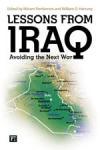 Those of us with enough years under our belts may remember one of the favored slogans of Vietnam anti-war protesters: “What if they gave a war and nobody came ? “Today’s revised version might be: “What if they gave a war (or two ) and nobody cared .”
Those of us with enough years under our belts may remember one of the favored slogans of Vietnam anti-war protesters: “What if they gave a war and nobody came ? “Today’s revised version might be: “What if they gave a war (or two ) and nobody cared .”
Congress is in the midst of ginning up the latest “emergency”cash infusion for our two wars. The public on whose behalf they are doing this is mostly thinking of other things.
The American people have expressed themselves clearly on the Iraq War itself for quite a while now. By large majorities hovering around 70 percent, they want it to end. Fulfilling this expressed will of the people is our most urgent foreign policy priority, one that can’t be forgotten, ignored or deferred.
But there is other, related, unfinished business to which we as a people need to attend. The worst foreign policy disaster in U. S. history may actually have an upside of sorts: that the war has served as a tryout for a number of policy innovations. “Thanks” to the war, we know enough now to cross them permanently off our list.
Here are a few:
- Preventive war. In place of the idea that wars should be started only as a last resort, our current national security doctrine is based on the theory that they should be fought to prevent future enemies from developing. They are the means to create the conditions of peace. Our Iraq experience has been the test case for this theory. We know now how well it has worked out.
- Politicized intelligence. Knowing that these theories were not, by themselves, going to create mass public support for an attack on a country that had not attacked or threatened the United States, the Bush administration set about to create a false case that such an attack might be imminent. They did it, among other means, by pressuring and manipulating our existing intelligence agencies, as well as by creating substitute intelligence organs, to give them the answers they wanted.
- The war on civil liberties. The preventive war doctrine paved the way for an emboldened assault on civil protections, from circumventing a congressional ban on torture of detainees to permitting warrantless wiretapping of citizens.
Other items for the list can come from the panoply of recent books that have laid them out in detail. Joseph Stiglitz and Linda Bilmes exposed the ravages of dishonest war cost accounting tricks in “The Three Trillion Dollar War. “Aziz Huq and Frederick Schwarz detailed the ways war has been used to push the frontiers of presidential power in “Unchecked and Unbalanced. “Norman Solomon examined the daring innovations in media manipulation that sold the public on this war in “War Made Easy.”
In my own book,” Lessons From Iraq,” these writers and others have boiled down what they know for the rest of us. The result is a list of 17 lessons, and a brief for each of them. They are directed at three different targets: the reasons why we went to war, the ways we were convinced to go to war, and the “collateral damage,” the expansion of both executive power and the private sector, as well as the constraint of our civil liberties that were achieved by war. These pernicious achievements now have to be unachieved.
The pointing out of these lessons is meant to start a debate rather than end one: Are the above the right lessons to salvage from this debacle ? What others should be added ?
It’ll be our job as citizens to flesh out the list. And most importantly, to figure out how to pinpoint these items on the policy map as places we never need to go to again.
Distributed by Minuteman Media.